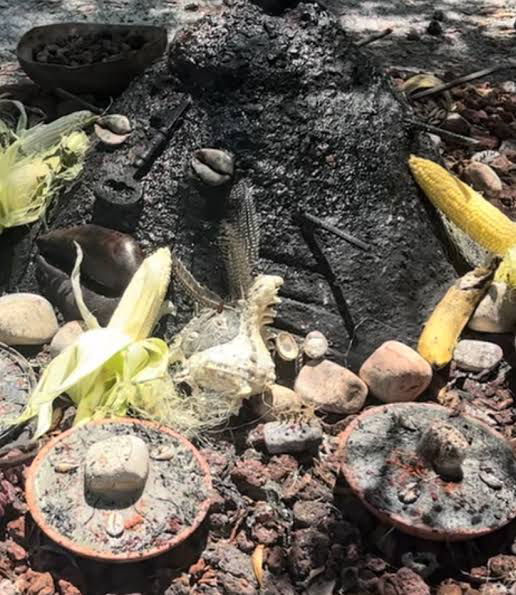Reasons why ẹbọ is always given to Èṣù Ọ̀dàrà
Attention has been drawn to the unsurprising info spitted out by a self-acclaimed "Babalawo" of whom I have only known as just a Nollywood veteran whose role has contributed immensely to the development of the industry. His assiduity on Irúnmolè that they are irrelevant and that, Èṣù (plus other orisas) to be precise is just a mere laterite rock that can't speak nor eat visibly. Hence, it is "futile".
This is totally untrue, the role of Èṣù in the sphere of Isese is ultimately pivotal to its effective success, as a "Babalawo" and as an "Olori awo of ìfiṣe Èkìtì" why would you not have Èṣù in your domain? It would be of great shock to many if you do not know or decided to look away from the great importance of Èṣù in the Isese domain.
In your words; "anything that has a name ofcourse exists". This contradicts your take on Esu as well as other deities.
Your assertion is the same as that of a layman who of course has a minute or no knowledge as regards Isese. I am pretty much sure you offer ẹbọ as "babaláwo" and am sure there is a default place where you put the ẹbọ. The default place which has been from time immemorial Èṣù's.
Anyways to cut the story short, here are why Ẹbọ is always given to Èṣù.
The first is his major function as the messenger, an intermediary between Olódùmarè and deities so does he play the same role between man and The Supreme Being.
Since he is saddled with the responsibility of checking and reporting on the correctness of worship and in particular ẹbọ, Èṣù is given the authority to report anyone who makes ẹbọ and anyone who does not. He is the one who takes the ebo to heaven for approval when properly done.
Èṣù is the bearer of ẹbọ. However, Esu happens to be the first spiritual "gate-keeper" in the process of ẹbọ rírú before it reaches Òkànràn-Òsá [the gate-keeper in heaven]. He decides which ẹbọ goes through and which does not. This is to say, every successful ẹbọ has the “Àṣẹ” of Esu in it since he is the first divinity the ẹbọ passes through before arriving at any other spiritual junctions. He approves or disapproves using his Àṣẹ known as Àdó Ìsúbi-Ìsúre.
Another yardstick that verifies Èṣù as the default Irunmole for ẹbọ is the general belief that Èṣù is one of dread even also by other divinities because Esu can upset situations. This is due to the virtue of his assigned role, he holds the power of life and death over them as prosperity or calamity for them depends upon what reports he carries to the Supreme Being. This is why keeping good terms with him is advisable and, one of the ways to ensure this, is by ẹbọ. This is why you hear the phrase; Bí a bá rúbọ, kí á mú t'Èṣù kúrò - when ẹbọ is made, the portion of Esu should be set aside.
This also conforms to the Yoruba aphromism that goes thus; Ẹni tó bá rúbọ lèèṣù ǹ gbè -Esu supports whoever performs ebo.
Another reason which is the last is the close relationship that exists between Èṣù and Ọ̀rúnmìlà. It is wildly believed among babalawo that Èṣù was created to be the right hand divinity to Orunmila.
It is his (Èṣù) duty to run errands for Ọ̀rúnmìlà; he (Esu) must always be in attendance upon him and act under his (Orunmila) orders.
However, it is believed that if Orunmila or any Babalawo performs ẹbọ rírú without the consent of Èṣù, the ẹbọ is nothing but futile.
The close relationship between the two is visible on almost if not all Ọpọ́n Ifá (divination tray) where Èṣù's head is carved right at the top of the ọpọ́n. This is why Ọ̀rúnmìlà gives something (ebo) in appreciation to Esu for his immesurable service rendered.
So baba as a "prolific babalawo" why would you not have Èṣù in your domain?
Àbọrú àbọyè
Awo Fayemi Oyesanya.






Comments
Post a Comment